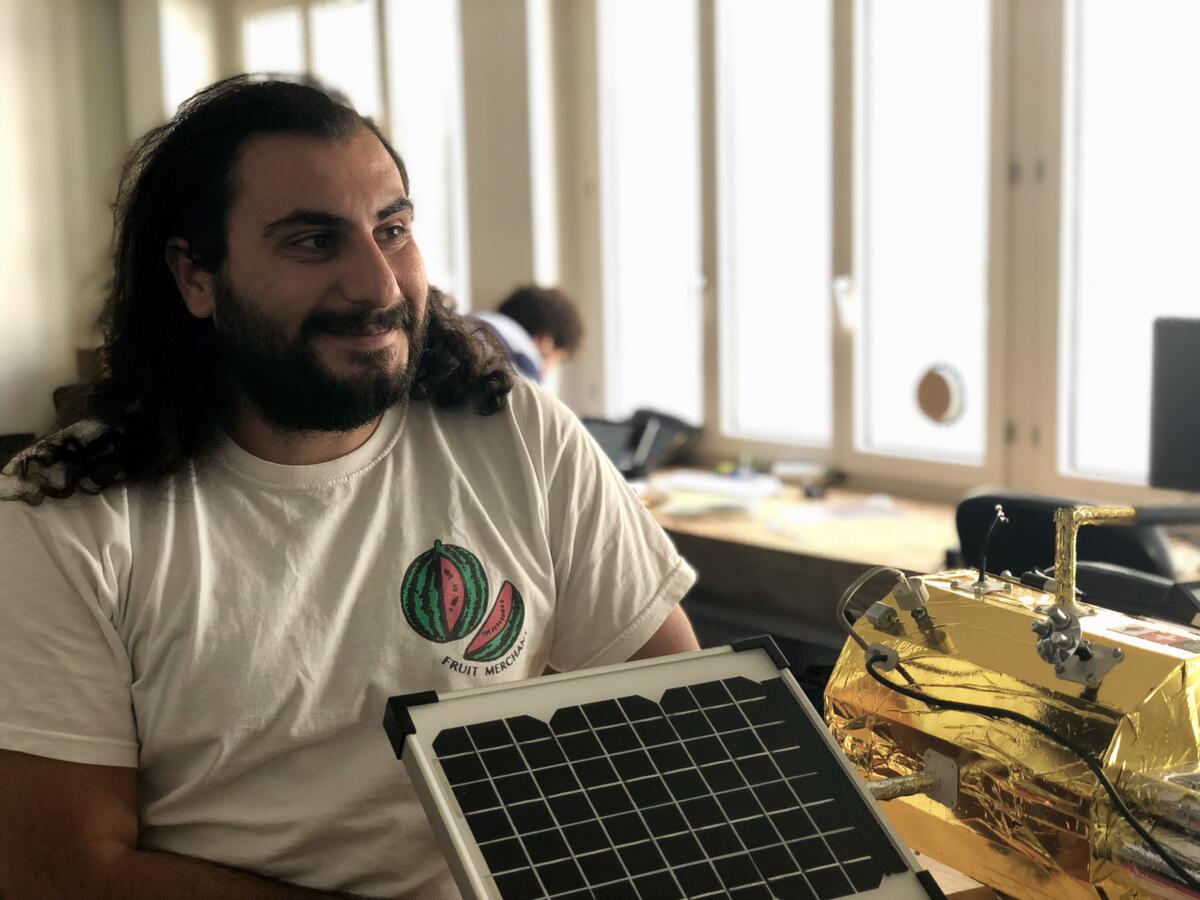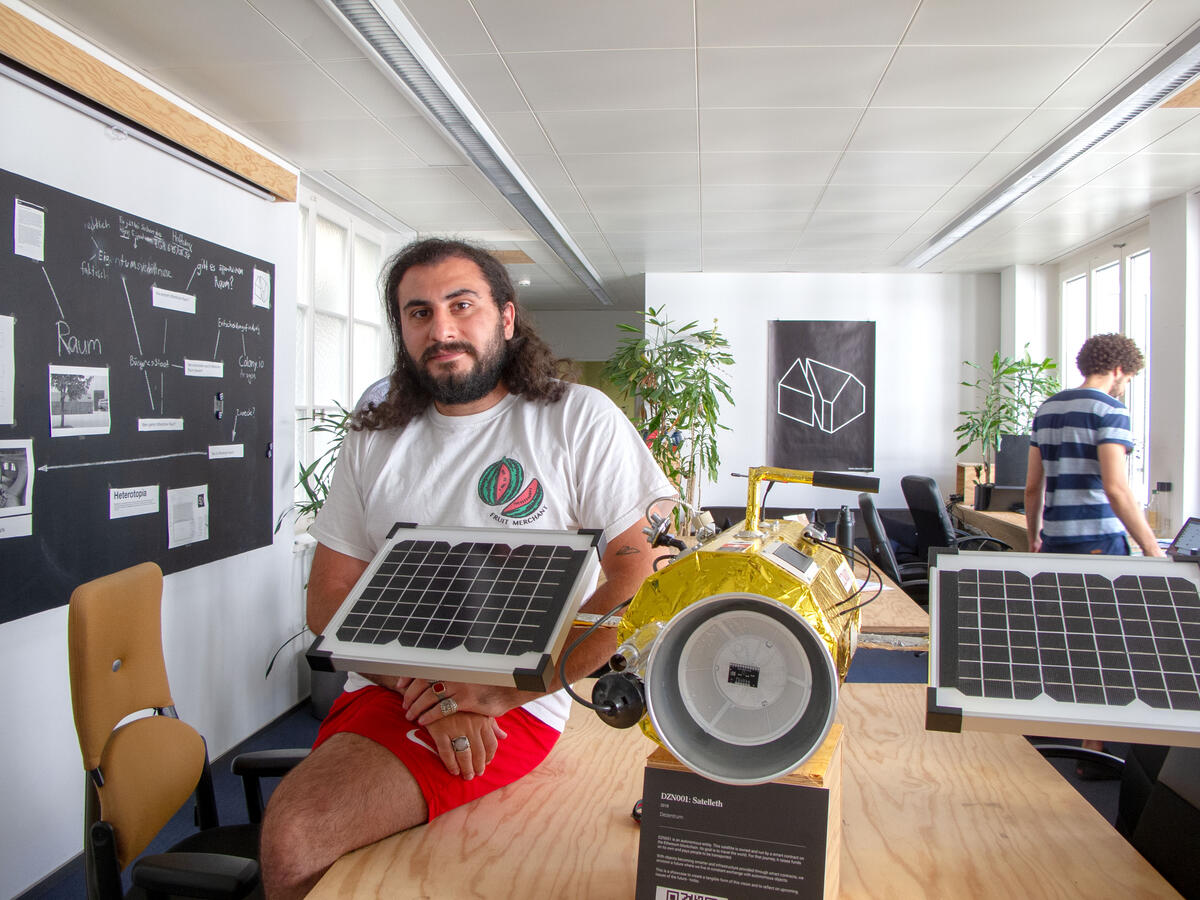A national exhibition enters new technological territory
03. September 2019, Yves Bisang und Juri Steiner An interview with Ozan Polat from ThinkTank Dezentrum

Since the 1970s, we've observed the trend towards decentralisation in various areas. Economists rely on decentralised methods to achieve efficiency; IT systems are given tighter security by way of decentralisation, and companies swear by flat hierarchies as well as decentralised organisational structures. Thanks to its decentralised governmental structure, Switzerland is an inspiration to countries like South Korea.
Our national exhibitions also manifest this trend. If decentralisation is about the venues, in retrospect, previous exhibitions have become increasingly decentralised. While the national exhibitions in Zurich (1939) and Lausanne (1964) were each tied to a single location, the Expo.02 already encompassed a network of four cities: Biel, Murten, Yverdon-les-Bains and Neuenburg. The next national exhibition is a continuance of this trend towards decentralisation: NEXPO will be distributed among at least ten cities.
Ozan Polat and the ThinkTank Dezentrum carried out a study on the potential of "decentralised technologies" for NEXPO. What were its findings?
The envisioned platform – NEXPO's heart – strives to mobilise the participating population as actively designing players by drawing on decentralised technology. A technologically decentralised platform turns users into participants thanks to their support of the network through their own nodes. A central authority that gathers and validates the data is no longer necessary. Such a platform can be seen as a blockchain-based decentralised solution. Thus, NEXPO becomes an innovative real-life example of this new technology with far-reaching repercussions on our understanding of political processes and participation modes.
NEXPO takes place at various locations in Switzerland. Doesn't this in itself make good on the promise of decentralisation?
Geographical decentralisation is a start, but we are also interested in the technical decentralisation of the project platform – see blockchain – as well as organisational and participatory decentralisation. These systems are meant to empower their users. Through them, the Swiss people will design their exhibition, they are responsible for the ideation and implementation of NEXPO's projects. In such a system, decentralisation and participation are intertwined.
"In contrast to the last national exhibition 17 years ago, today's processes must answer the demand for transparency, be it political, economic or with respect to content. We wish to stimulate real debate, not mock dialogue." Ozan Polat
Auf dem Laufenden bleiben?
Abonniere unseren NewsletterWith its federal system and direct democracy, Switzerland is already a leading player when it comes to decentralisation and participation. Is NEXPO a technical booster of these two Swiss values?
Yes, on the one hand, it exemplifies a well-known IT principle: "better, faster, cheaper". New technologies simplify and speed up existing values. Take e-voting, for example. It is all about lowering the access barrier to participation in elections while maintaining safeguards such as anonymity and traceability. Initiatives that tackle these issues with all the necessary care already exist, and can be easily combined with NEXPO.
In contrast to the last national exhibition 17 years ago, today's processes must answer the demand for transparency, be it political, economic or with respect to content. We wish to stimulate real debate, not mock dialogue. A decentralised platform offers the technical possibilities to design a participation campaign that's more transparent than EXPO.02's. This system will allow us to get a better understanding of what people care about and get closer to the issues that concern them.
What is the innovative aspect of a technically decentralised platform?
There's a security risk associated with running a platform via a single server – a so-called "single point of failure". The server can crash or somebody can hack into the server from outside and tamper with it or steal information. If we take the control away from this one server and distribute it to ten different cities or the entire population, we can achieve a markedly higher level of security. This brings us to blockchain and other decentralised technologies, one of the most innovative fields of the last decade. Using blockchain-based technologies for the concept and implementation of an entire national exhibition – a generational project – elevates the idea to a completely new dimension. We are entering terra incognita and building a "lighthouse project".
What is the highest degree of technical decentralisation for such a platform?
The highest degree will exist as soon as everybody supports this platform with their own small computers to secure the network.
"Large blockchain-based networks need extremely high computing power." Ozan Polat

What challenges exist?
At the moment, scaling public blockchain networks is the most significant problem. In the fall of 2017, the popular decentralised application known as Ethereum blockchain revealed that extensive use and a high frequency of transactions can "clog up" a network. Large blockchain-based networks need extremely high computing power.
Is this really necessary for NEXPO? Are there less decentralised alternatives?
There is the possibility of a "permissioned blockchain" where participation in the network is allowed for approved users only (with prior registration, for example). This would require that participants would have to engage with the NEXPLORER survey before becoming a part of the NEXPO network.
Restricting the network at validating nodes is another possibility (to the cities currently participating, for example), which would reduce the required computing power. This would render a lower degree of decentralisation but ensure a smooth solution for scaling and control mechanisms.
"In contrast to Facebook and Google, no data is gathered centrally. Data is validated by several authorities, and this validation is stored securely in the network by the algorithm." Ozan Polat
We are entering new territory with a technically decentralised platform. How can we make sure that starting in 2020, we are ready to begin accepting Calls for Projects?
We recommend setting up a pilot platform on a conventional technical solution and then incorporating the decentralised aspects of participation and decision-making. From here, the system can be gradually turned towards a technologically decentralised solution.
What about data security and data sovereignty? What will prevent it from turning into a data-hungry giant like Google or Facebook?
With decentralised technologies, the platform won't be run by a single, centralised company; rather, it will be distributed among all participants.
In contrast to Facebook and Google, no data is gathered centrally. Data is validated by several authorities, and this validation is stored securely in the network by the algorithm. Data security and data sovereignty exist at a very high level with blockchain-based solutions.
What socio-political benefits might this pioneer project have?
Innovationen im Bereich der dezentralen Technologien ermöglichen ein noch nie dagewesenes Mass an Partizipation. Die dezentrale Projektplattform bietet ein hervorragendes Testfeld für die Weiterentwicklung von E-Voting, E-Government, digitalen Identitäten und Datensouveränität.
Additional Content
NEXPO gets a new member
Glarus, the smallest cantonal capital in Switzerland, is now also a member of “NEXPO - the new Expo”.
Read article...Switzerland and its Limits
In Geneva, a roundtable by Samia Henni, a walk by Aline Mona Zuber and a newly produced film by Ayo Akingbade explore involvements in colonial pasts and postcolonial presents.
Read article...